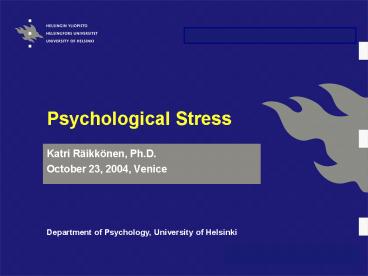Psychological Stress
1 / 17
Title: Psychological Stress
1
Psychological Stress
- Katri Räikkönen, Ph.D.
- October 23, 2004, Venice
Department of Psychology, University of Helsinki
K. Räikkönen, October 23, 2004, Venice
2
Co-authors
Karen A. Matthews, Ph.D.Department of
PsychiatryUniversity of Pittsburgh School of
MedicineLewis H. Kuller, M.D.Department of
EpidemiologyUniversity of Pittsburgh Graduate
School of Public Health
K. Räikkönen, October 23, 2004, Venice
3
Neuroendocrine dysregulation hypothesis
Background
Depression Unpleasant social conditions
Neuroendocrine responses
Metabolic syndrome
Smoking, alcohol, other unhealthy behaviors
Other stresses
Björntorp, Int. J. Med. 1991230195-201 Bouchard
et al., Endocrine Rev. 19931472-93
K. Räikkönen, October 23, 2004, Venice
4
Purpose
- Are psychological stress and the metabolic
syndrome associated? - Do psychological influences on the metabolic
syndrome contribute to the explanation of social
inequalities in morbidity and mortality? - Can associations be identified already in
children and adolescents?
K. Räikkönen, October 23, 2004, Venice
5
Metabolic syndrome criteria
- ATP III (JAMA 2001 285 2486-97)
- WHO (Consultation Report 1999)
- EGIR (Diabetes Metab 2002 28 364-76)
- AACE (Endocrine Practice 2003 9 240-252)
- Characteristics as continuous variables
Measured
- in 466 women 5.3 times over 11.9 years
K. Räikkönen, October 23, 2004, Venice
6
Psychological stress
- Depression (Beck)
- Trait Anger (Spielberger)
- Trait Anxiety (Spielberger)
- Framigham tension
- Cohen Perceived Stress
K. Räikkönen, October 23, 2004, Venice
7
Räikkönen, Matthews, Kuller HWS unpublished data
Metabolic syndrome prevalence and incidence.
n 120
n 91
n 52
n 52
n 32
ATP III
WHO
EGIR
AACE gt 2
AACE gt 3
K. Räikkönen, October 23, 2004, Venice
8
Räikkönen, Matthews, Kuller HWS unpublished data
Psychological stress and the metabolic
syndrome. Numbers below are p-values.
-
Incidence over 11.9 years - Psychological stress
AACE AACE - at baseline ATP III WHO
EGIR gt2 gt3 - Depression .02 .02
.24 .07 .007 - Trait Anger .000 .16
.004 .001 .000 - Trait Anxiety .40 .36
.55 .07 .04 - Framingham tension .08 .08 .05
.006 .08 - Cohen perceived stress .06 .003 .26
.07 .002
K. Räikkönen, October 23, 2004, Venice
9
Räikkönen, Matthews, Kuller HWS unpublished data
Clusters of metabolic syndrome characteristics.
Waist
Glucose
Diastolic BP
Triglycerides
Systolic BP
HDL Chol.
10
Percentage belonging to the metabolic cluster
according to quartiles of psychological stress.
2.67 (1.40-5.07)
1.88 (1.01-3.51)
Depression p lt .04
Trait Anger p lt .004
K. Räikkönen, October 23, 2004, Venice
11
Räikkönen, Matthews, Kuller HWS unpublished data
Metabolic syndrome incidence according to SES.
Degree beyond college
Degree beyond college
High school
High school
ATP III Time (yrs)
WHO Time (yrs)
Hazards Ratio .74 (.61-.89)
Hazards Ratio .59 (.42-.83)
K. Räikkönen, October 23, 2004, Venice
12
Percentage belonging to the metabolic cluster
according to SES.
2.67 (1.40-5.07)
High school
Some college
College degree
Beyond college
p lt .005
K. Räikkönen, October 23, 2004, Venice
13
b -.18, t -3.14
Glucose
.59
Triglycerides
.58
b - .17, t -2.54
b .18, t 2.13
-.46
HDL-Chol.
Psychological stress
Metabolic syndrome
SES
.78
Waist
.67
.35
.63
.21
Systolic BP
Depression
Trait Anger
Diastolic BP
Baseline
Cumulative load over 11.9 years
K. Räikkönen, October 23, 2004, Venice
14
Räikkönen, Matthews Salomon, Health Psychology
2003, 22, 279-286
Hostility scores according to the metabolic
syndrome chracteristics in children and
adolescents.
Cook-Medley Total scores
Body Mass Index p .03
Insulin resistance index p .051
K. Räikkönen, October 23, 2004, Venice
15
Conclusions
- Depressive symptoms and frequent and intense
feelings of anger increase the odds for
developing the metabolic syndrome over time in
women. - These symptoms and feelings may, at least
partially, explain/mediate the adverse health
effects of low SES. - Prevention and intervention decades before
clinical manfiestations are encouraged.
K. Räikkönen, October 23, 2004, Venice
16
Gaps and future directions
- Physiological mechanisms?
- Are psychological stress and the
- metabolic syndrome manifestations of
- a same underlying predisposition?
K. Räikkönen, October 23, 2004, Venice
17
Thank You !
K. Räikkönen, October 23, 2004, Venice































